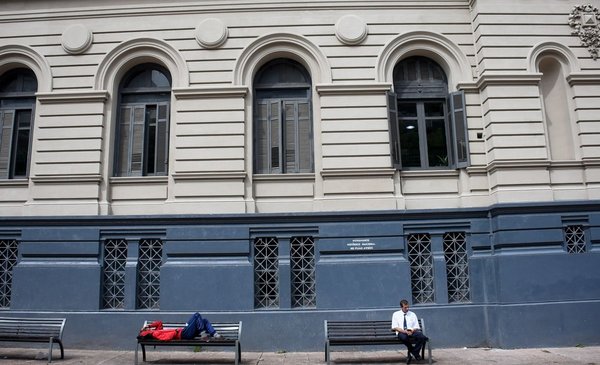After four hours of session, most members (18 of 20) of the Central Board of Directors (CDC) from the University of the Republic (Udelar) concluded that Grade 5 Mathematics teacher Martín Sambarino committed inappropriate behavior while he was his former student’s thesis tutor Graduate Adriana Da Luz.
The student denounced the teacher, with whom she shared a stay in an apartment in France, in 2019, alleging that the teacher had an “extremely inappropriate” attitude during one night, when he wanted to hug her. When she refused, she added, she stopped correcting her thesis and to attend their work meetings.
All the members of the council -except two- defined the teacher’s action as “inappropriate behavior”that also marked as “serious” 16 of the 20 participants. Despite the consensus on the seriousness of the incident, the general ruling of the CDC rejected this Tuesday the motion to impeach Sambarino, as proposed by the Faculty of Sciences. The authorities of that institution had unanimously requested his definitive expulsion from the university.
But why, if the vast majority of the members agreed that it was a serious offense, did they decide not to dismiss him or sanction him?
Héctor Cancela, president of the Teachers’ Association of the University of the Republic, explained a The Observer that despite the mutual agreement on the seriousness of what happened, it was not understood that a dismissal was the appropriate resolution for the case. “yesterday’s vote what it reflects is not that they do not want to sanction these behaviors, but on the contrary: it includes the mention that it is a serious behavior and it is understood that it is punishable, but it also reflects that a majority of the CDC understood that the penalty should not be dismissal“.
However, the Udelar CDC had no room to apply a sanction other than dismissal. Now, the subject returns to the Faculty of Sciences.
“There is a general principle, which is the proportionality between the faults and the applied sanction. The assessment of the seriousness of the faults is made personally by each director. Each one sees in the file what has been verified and makes their own composition regarding the seriousness of the fault. There’s a question of personal conviction as to whether it’s serious enough for impeachment,” he said.
Among the teaching delegation there were different positions on the matter. Some took a criterion of “proportionality” between the teacher’s fault and the punishment that he should finally receive, while others, such as the dean of the Faculty of Engineering, María Simon, and the dean of the Faculty of Law, Cristina Mangarelli, considered that there was not even evidence to define the conduct as inappropriate.
“I agree with what Civil Service says that there are no reasons that warrant dismissal”Simon pointed out about the resolution of the National Civil Service Office (ONSC), which in March assured that there were no elements to prove the abuse.
The former Minister of Education and Culture justified her negative vote on the motion that defined the behavior as inappropriate by understanding that it was not specified. “I understand that if it is said that there were inappropriate attitudes, it is necessary to say what attitudes and what norms contravene. It is necessary to say what are inappropriate attitudes and what norms they are against, and that was not specified. I dissent from that resolution because I don’t think it’s appropriate to make a vague accusation”
Despite their discrepancies, the dean -who said he had exchanged some e-mails with the complainant and had seen the professor in some exhibitions- He stated that he was satisfied with the final decision of the CDCalthough he added: “It would be nice if the CDC supported the mathematician researchers and researchers who have been smeared in various media outlets.”
On the other hand, clarified that he is against “all forms of harassment” existing and stressed that the Faculty of Sciences is making efforts to improve the prevention of bullying. “It is impossible that in an institution of so many people there are no cases, but we are trying to improve the forms of complaints, the accompaniment of the complainants and the justice and balance in the process. What can give guarantees in this particular case is that it was investigated very seriously“, he stressed.
And he insisted: “The rights of women or of any group are not defended by making resolutions that are not adjusted to the law in their name.”
Professor Sambarino may now be sanctioned for a maximum of six months, as determined by the Faculty of Sciences.
The council’s decisionwhich closed this Tuesday around 10 p.m. was questioned by mathematician Jana Rodriguez Hertz, who pointed to the result as another example of discouraging claims of sexual harassment. “Then do not come with why they do not make the complaints“, he wrote on his Twitter account.
In response, Cancela pointed out: “The opinions expressed on the networks are the opinions of specific people. The conclusions that each one draws from the vote and the results are their own. Each one has the right to interpret in a certain way and what we understand is that The vote reflects the care that the institution puts into the complaints and the fact that when there is a proven complaint, (the Udelar) is willing to reach the corresponding sanction, proportional to the facts”.







